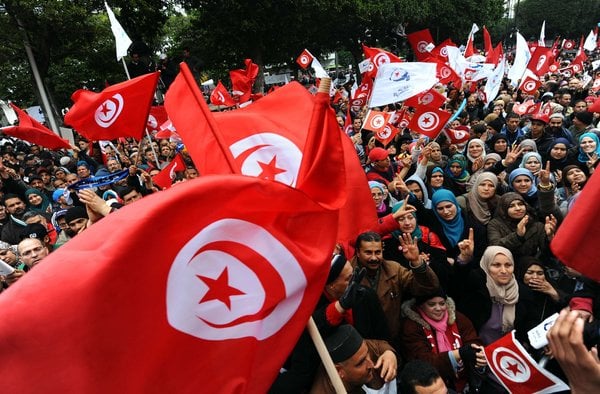
Tunisians observe the third anniversary of the end of totalitarian rule, in January 2014. While much progress has been made toward becoming a true democracy, many challenges still lie ahead. Photo: Fethi Belaid/Agence France-Presse — Getty Images
This past week, radical Islam reared its ugly head again, this time in a seaside suburb of Tunis. On Monday afternoon, the National Guard was called in to investigate a reported terrorist hideout in the Raoued suburb of Tunis. The 24-hour standoff that ensued resulted in the death of seven militants and one police officer, and follows similar actions taken back in August, when eight National Guardsmen were killed in clashes with terrorist groups in western Tunisia. In the past month, there were also two failed suicide bombings. In the three years since Tunisia led the Arab Spring and overthrew its dictator, the country has been rife with violent disagreement over its future, while radical Islamists have grown in strength bolstered by weapons from neighboring Libya. Radical Islamist groups were apparently behind the earlier assassinations of two leftist political figures. In a country plagued with intermittent violence, it would seem many would have lost hope by now for a peaceful environment.
But just days before the latest violence, Tunisians regained some lost hope, as a new constitution was adopted and the Islamist-dominated government resigned quietly, replaced by a cabinet of technocrats headed by Mehdi Jomaa. The new constitution recognizes Tunisia’s status as a large melting pot of Arabs, Berbers and Turks, of Muslims and Christians, and of Jews and atheists, who are protected from prosecution. While the new constitution states that the president of the republic must be Muslim and Islam will be the state religion, the state will be civil and education will teach both the Arab-Muslim heritage and the culture of human rights. The adoption of the new constitution thus represents a significant step forward for Tunisia and holds out promise for other nations fighting for their own Arab Spring.
In Tunisia, the juxtaposition of the forward progress on the administrative and judicial front with the continued battles on the terrorism front is most striking. For many Tunisians this means a daily wavering battle between the forces of doubt and hope, a fluctuation which takes place many times a day. Three years on, progress has been slow but steady, but many challenges remain. With an unofficial unemployment rate approaching 15 percent, the new technocrat government needs to move fast. When I visited Tunis last March as part of a U.S.-backed Financial Services Volunteer Corps delegation, we hoped to stimulate efforts which were underway to implement a series of investment funds to address unemployment, particularly in the less developed hinterlands. Now that there is renewed stability in government and a new constitution has been signed, these initiatives need to be reinvigorated by the interim technocratic government. With tourist numbers growing again, even greater efforts need to be made to comfort prospective tourists that visiting the country can be done safely. And efforts need to be undertaken to deal with the proliferation of recent strikes in the country’s interior. Thankfully, with elections slated for this fall, there is once again renewed hope that Tunisia can lead the Arab world in the transition to good governance.